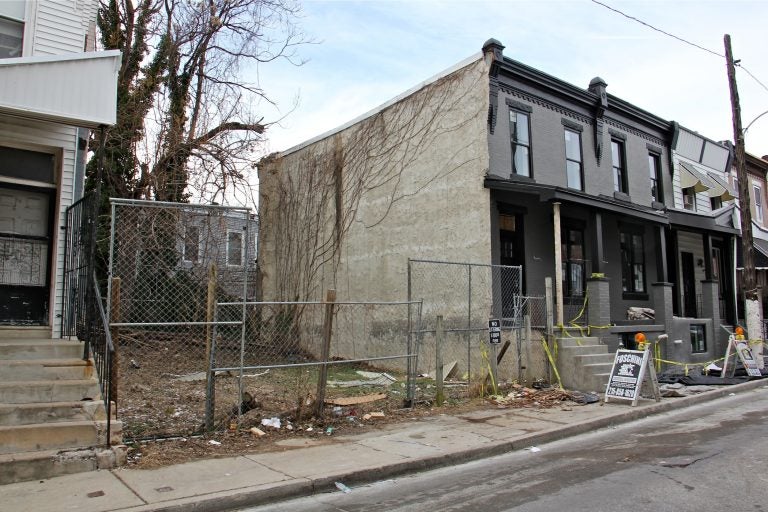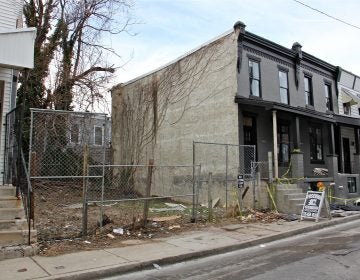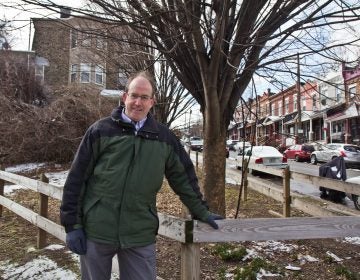Troubled Philly land sale office facing takeover after scandals
A once-obscure city office that critics link to Philadelphia’s pay-to-play political culture will soon be taken over by the Philadelphia Land Bank.

A Philadelphia judge purchased this row home at 1514 N. Hollywood Street and the two adjacent vacant lots from the city. (Emma Lee/WHYY)
This article originally appeared on PlanPhilly.
—
A once-obscure city office that critics link to Philadelphia’s pay-to-play political culture will soon be taken over by the Philadelphia Land Bank, according to a memorandum of understanding obtained by PlanPhilly.
The memo outlines a plan to effectively merge the staff functions of the controversial Vacant Property Review Committee into the Land Bank, which was created in 2015 to centralize and simplify city land sales. Under the current system, these staffers are charged with vetting prospective buyers interested in public land.
But VPRC staff mistakes and missteps play a central role in recent accounts detailing chronic undervaluation of land and political meddling in land deals. In the wake of these stories, the Philadelphia Redevelopment Authority — which must finalize public land sales — froze all VPRC transactions, pending reform.
The VPRC was initially intended only to advise the city’s Department of Public Property regarding sales of some 2,500 unused publicly owned lots controlled by that office. But the tiny office and its staff members instead became an integral part of appraising and processing the sale of the department’s land, which comprises 52 percent of all city-owned lots listed for sale.
Both VPRC and Land Bank employees are technically housed within the same nonprofit, the Philadelphia Housing and Development Corporation. But despite this superficial proximity, the two offices do not employ the same land sale or recordkeeping policies.
“Although the review committee is staffed by administration officials it is controlled by council,” Pew Charitable Trusts wrote in a 2015 report that described the VPRC. “Its operations follow no written bylaws or guidelines, officials say, and its work gets little public attention.”
Kelly Cofrancisco, a spokesperson for Mayor Jim Kenney, said the proposed changes would eliminate this bifurcated system by bringing VPRC sales under the auspices of the Land Bank.
“The Land Bank will apply its land sales expertise to Department of Public Property land to more effectively review a purchaser’s plans before a sale and to better monitor purchaser compliance after the sale,” said Cofrancisco. “When signed, this memorandum of understanding will ensure uniform property disposition policies across all land holding agencies.”
The new agreement aims to make it harder for buyers to purchase and flip land with few strings attached — a common scenario under the current system and one that figured into recent scandals.
Instead of the threadbare deed restrictions now used in sales handled by the VPRC, future transactions will feature the purchase and development title agreements employed by the Land Bank. These typically require that properties be improved before sale, discouraging speculators and other buyers trying to cash in city land without building anything.
But Thomas Earle, an affordable housing developer and member of the Coalition for Affordable Communities, said the city’s land sale problems go much deeper.
He said that the VPRC acted as a means for councilmembers to exert tighter authority over land sales. While city charter and state law require that council vote on resolutions approving public land sales, Earle said the VPRC process acts as another, unnecessary check.
“The Vacant Property Review Committee has really slowed down the disposition of property,” he said. “The practice of a requiring a support letter from a councilperson to get in front of the VPRC has puts these properties into the hands of people that are politically connected. And it slows down the process.”
Council President Darrell Clarke denied this. Spokesperson Jane Roh said the board “was authorized by a resolution of Council but is staffed entirely by Administration employees, who do not report to Council.”
Information about the VPRC is listed on Council’s website and described as an “ongoing initiative.” Clarke personally pushed for the board to be included in the Land Bank sale process, against the wishes of some critics. And while a plurality of VPRC board members are appointed by the mayor, the chair is appointed by Clarke. The current chair, Susan Jarmon, also serves as the most senior VPRC staffer.
Michael Koonce, a former PRA director who now serves as Clarke’s second appointee to the VPRC board, said he was unsure who, exactly, the VPRC employees reported to.
“I just assumed they reported to the director of the Philadelphia Land Bank director or PHDC,” he said.
However, Koonce said he was supportive of the proposed changes and wanted future reforms to go even further. He said VPRC staffers had been overwhelmed by the sheer number of land sales and the intensive reviews that come along with them.
“They were only vetting developers for tax delinquency and prior code violations,” he said. “They had the capacity to do it the way it had historically been done. But they didn’t have the capacity to do the deep dive.”
WHYY is your source for fact-based, in-depth journalism and information. As a nonprofit organization, we rely on financial support from readers like you. Please give today.







